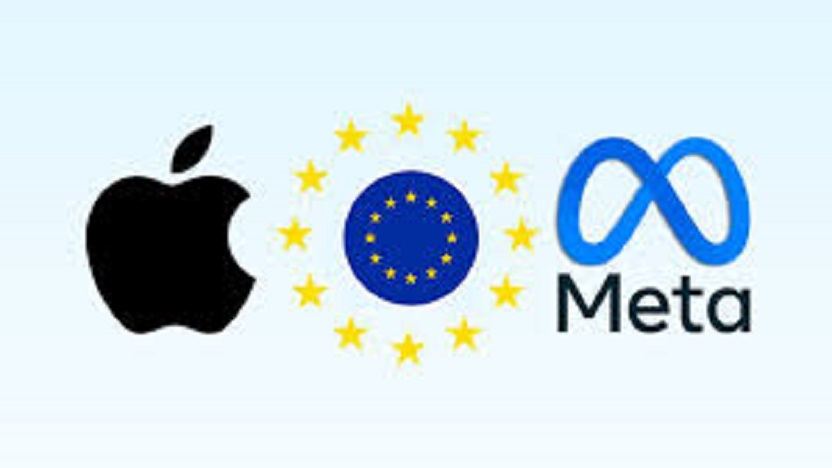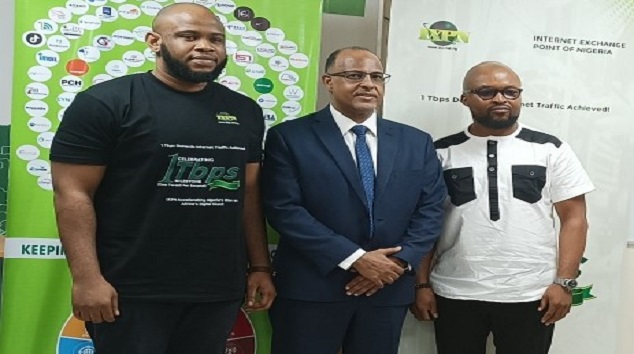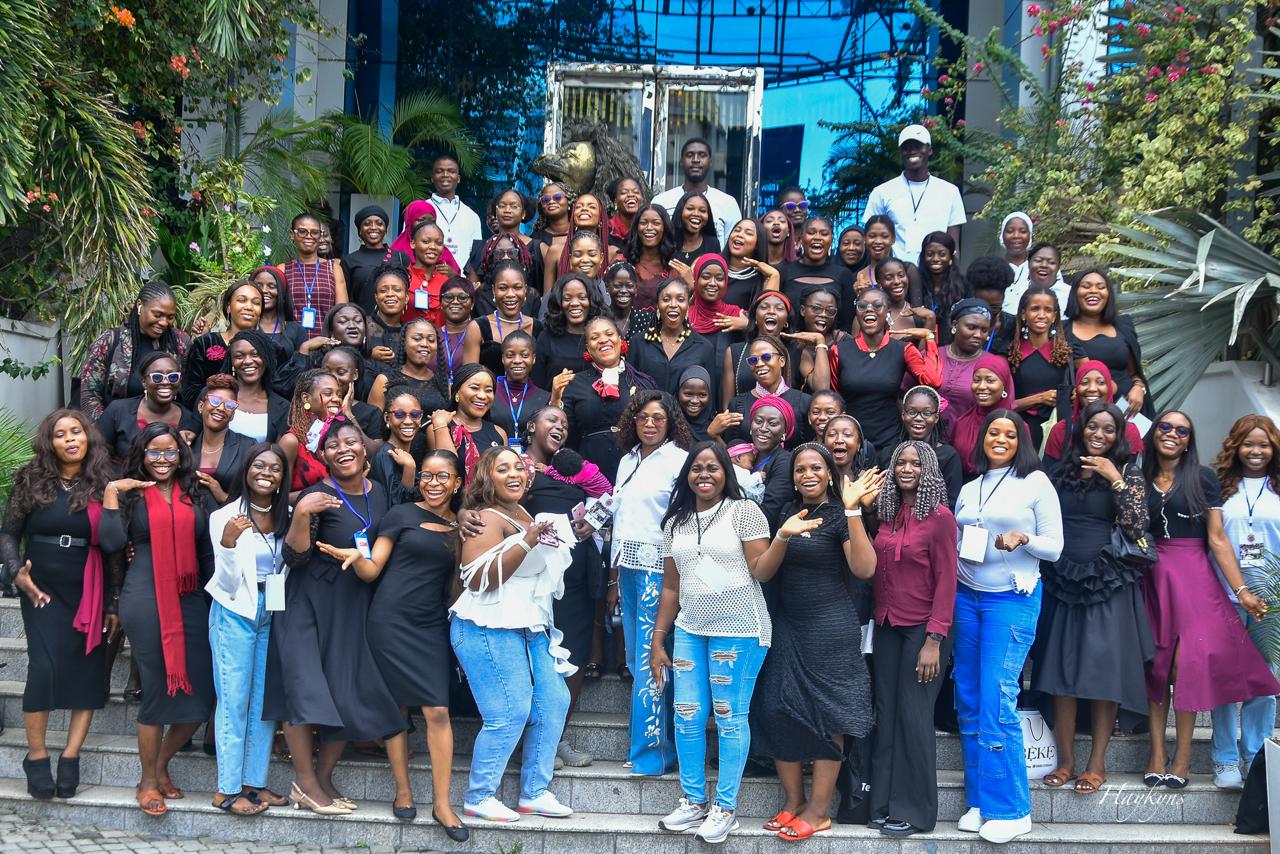Telecom
Google Grants Nigeria N2.8Bn for Al Development to Advance Digital Economy

Google.org has announced a N2.8 billion AI Talent Development grant to the country through the Federal Ministry of Communications, Innovation, and Digital Economy (FMCIDE).

This is in a bid to support Nigeria’s economic growth through AI development,
This groundbreaking ₦2.8 billion grant initiative aims to equip thousands of Nigerians with advanced AI skills to thrive in the global economy. Importantly, it seeks to transform the country’s digital ecosystem, creating benefits such as employment opportunities, infrastructure development, effective service provision in every sector, and ultimately, economic growth.
“This support from Google is a testament to our commitment to positioning Nigeria as a leader in AI innovation,” said Dr. Bosun Tijani, minister of Communications, Innovation, and Digital Economy.
“By leveraging Google’s expertise and resources, we are creating opportunities to equip Nigerians with the skills they need to thrive in the global digital economy. This is a major step forward in our journey toward a more inclusive and innovative future for all Nigerians,” he added.
In announcing the AI Talent Development funding, Matt Brittin, president of Google for Europe, the Middle East, and Africa, expressed Google’s commitment to Africa’s innovation ecosystem, stating, “Across Africa, entrepreneurs are harnessing the power of technology, including AI, to address large-scale societal challenges.
Google remains committed to supporting these innovators, helping them expand their impact across the continent and beyond. Our work in Africa has always been about unlocking the benefits of the digital economy for more people, and this collaboration continues that mission.”
He noted that the initiative was a collaborative effort between the National Centre for Artificial Intelligence and Robotics (NCAIR) and Google to support AI-driven startups in Nigeria.
“I’m pleased to announce that Google.org is providing ₦2.8 billion (approximately $1.7 million) in funding to the Data Scientists Network Foundation, supporting the Honourable Minister’s vision for AI growth in Nigeria. This funding will be directed toward critical initiatives that advance AI skills and opportunities across the country.
“Through this grant, we’re supporting the FMCIDE’s 3 Million Technical Talents (3MTT) program, focusing on equipping 20,000 young Nigerians with advanced skills in AI and data science.
Additionally, the Experience AI Program, developed with the Raspberry Pi Foundation, will train 25,000 educators to inspire and educate 125,000 young learners, introducing them to AI fundamentals.
“We are also investing in the Government AI Campus Program, providing training and resources for Nigerian policymakers. This program will help ensure that as AI adoption accelerates, Nigeria’s public sector is well-equipped to navigate this landscape with a focus on responsible governance.
“The AI Fund, created in collaboration with NCAIR, is providing 10 promising Nigerian AI startups with ₦100 million in funding, alongside up to $3.5 million in Google Cloud Credits, mentorship from Google engineers, and technical support. This support will enable these startups to scale solutions that address local needs in areas like healthcare, energy, and security,” Brittin said.
Brittin also announced that selected startups addressing key societal challenges across sectors like healthcare, agriculture, and security will receive ₦100 million in funding. Additionally, these startups will benefit from $3.5 million in Google Cloud Credits, along with expert guidance from Google’s AI specialists.
Among the 10 chosen startups are BetaLife Health, an AI platform that addresses blood supply needs across Africa, and Trade Lenda, which leverages AI to streamline credit access for small and medium-sized enterprises.
These companies, alongside others such as Rana Energy and Towntalk, are tackling local issues with innovative AI solutions.
The Google chief also stressed that the economic potential for AI in Nigeria is vast. “AI has the potential to add as much as $15 billion to Nigeria’s economy by 2030.
By enabling entrepreneurs and digital talent to harness AI technology, this initiative aligns with Google’s commitment to driving sustainable growth in Nigeria’s economy.
This support builds on Google’s prior commitment of ₦1.2 billion in 2023, aimed at digital upskilling and economic empowerment across the country.”
According to the Communications Ministry, this announcement follows earlier efforts to introduce AI into Nigeria’s economic landscape, beginning with the National Artificial Intelligence Strategy (NAIS) Workshop and the launch of the National AI Intelligence Strategy. The strategy aims to leverage AI to drive growth across key sectors, ultimately enhancing the quality of life for all Nigerians.
The Ministry, which praised Google for the significant grant, noted that the funding will tremendously expand government efforts, reinforcing Nigeria’s role as an AI leader within Af
Telecom
EU Fines Apple and Meta €700m in Landmark Digital Markets Act Enforcement

European Commission has imposed landmark fines on tech giants Apple and Meta in the first enforcement actions under the Digital Markets Act (DMA), a new regulatory framework designed to enhance consumer choice and ensure fair competition in the digital economy.

Apple was fined €500 million (£428.3 million) for restricting app developers from guiding users to alternative purchasing options outside its App Store, a practice the commission said limited access to more affordable offers and stifled competition.
The commission has ordered Apple to amend its App Store policies by late June to comply with the DMA, warning that failure to do so could result in further daily penalties.
Meta, the parent company of Facebook and Instagram, was fined €200 million (£171.3 million) over its ‘pay or consent’ model, which required European Union users to either pay for an ad-free experience or consent to personalised advertising.
The commission found that this model failed to offer users a genuine choice and violated rules governing data processing and user consent. Meta’s revisions to this model, made in November 2024, are currently under review by the EU.
Both companies have pushed back against the commission’s decisions. Apple announced plans to appeal, stating that the ruling was unjust and detrimental to user privacy and security. “Today’s announcements are yet another example of the European Commission unfairly targeting Apple in a series of decisions that are bad for the privacy and security of our users, bad for products, and force us to give away our technology for free,” the company said.
Meta also criticised the EU’s approach, claiming that it imposes undue burdens on successful American companies while allowing competitors from China and Europe to operate under different standards. Joel Kaplan, Meta’s chief global affairs officer, said, “This isn’t just about a fine; the Commission forcing us to change our business model effectively imposes a multi-billion-dollar tariff on Meta while requiring us to offer an inferior service.”
The fines are part of a broader effort by the EU to clamp down on dominant digital platforms, known as ‘gatekeepers’, and ensure they do not abuse their market positions.
The commission has also concluded an investigation into Apple’s compliance with DMA rules on browsers and default apps, acknowledging changes that have opened up more space for competition.
However, Apple remains under scrutiny for its handling of alternative app marketplaces, which could attract additional penalties.
The enforcement measures may further strain transatlantic relations, with some in the United States, including former President Donald Trump’s administration, criticising the EU’s digital regulations as disproportionately targeting American firms.
Despite the pushback, the European Commission insists that the DMA is enforced impartially to safeguard consumer rights and foster a level playing field in the digital market.
Telecom
Nigeria Hits 1 Terabit Internet Traffic Milestone

IXPN, Nigeria’s leading Internet Exchange Point, is proud to announce a landmark achievement: crossing 1 Terabit per second (1Tbps) in aggregate peak domestic internet traffic for the first time.

This milestone signifies a major leap forward in developing Nigeria’s internet infrastructure and underscores the critical role of local internet infrastructure in driving economic growth, innovation, and connectivity for millions of Nigerians.
“This milestone is more than just a number. It’s a symbol of Nigeria’s digital maturity and our united strides towards becoming a tech-driven nation. By keeping local internet traffic within Nigeria, we reduce costs, improve speeds, and ensure our digital economy thrives with homegrown infrastructure.” said Muhammed Rudman the CEO of IXPN.
“Achieving 1 Tbps is a significant victory for Nigeria’s ICT ecosystem, a breakthrough for domestic internet traffic. It serves as a catalyst, enabling millions of Nigerians to enjoy faster, more affordable, and resilient internet connectivity.”

1 Terabit per second is a game-changer for Africa’s most populous country. To put it in perspective:
- Mega Video Calls: A speed of 1 Tbps can support over 1 million concurrent Zoom calls, allowing students, entrepreneurs, and professionals to connect and drive Nigeria’s digital revolution.
- Streaming Frenzy: With 1 Tbps, more than 200,000 people can stream HD Nollywood films or movies on Netflix simultaneously without any buffering or interruptions.
- Data Superpower: This speed enables the transfer of the entire contents of 50,000 smartphones—including photos, apps, and videos—in just one second.
For Nigeria, hitting this milestone means reducing reliance on international bandwidth, decreasing latency for local services, and strengthening our position as Africa’s digital heartbeat. This milestone is a testament to the power of collaboration, innovation, and the relentless pursuit of a faster, more connected Nigeria.
This accomplishment goes beyond technical advancements; it has significant economic implications. By encouraging local traffic exchange, IXPN reduces dependency on international bandwidth, leading to:
- Significant Cost Savings: By utilizing local data exchange, Nigerian businesses can save millions of dollars annually on international bandwidth fees.
- Enhanced Speed and Connectivity: With reduced latency, users experience smoother streaming, gaming, and real-time services, enhancing their overall online experience.
- Increased Resilience: Strengthening Nigeria’s internet infrastructure protects against global disruptions, ensuring consistent access to vital services such as healthcare and education.
- Improved Efficiency: Optimizes digital services like fintech, edtech, e-commerce, and e-health, propelling innovation and growth in these sectors.
Surveys conducted among IXPN members over the years have shown a growing percentage of local internet traffic in Nigeria. A recent report indicates that some connected members can localize or domesticate up to 70% of their internet traffic through IXPN.
“As more content providers, ISPs, banks, and public institutions localize their traffic through the IXP, end users benefit directly,” added Raphael Iloka (Marketing Manager). “We’re not just routing data — we’re building the foundation for Nigeria’s digital economy.”
The 1 Tbps peak highlights the remarkable impact of collaboration among all stakeholders. This milestone is a significant achievement not only for IXPN, but for the entire ICT ecosystem. IXPN deeply appreciates the vital contributions of all stakeholders involved.
To our Members and Partners: Your trust and participation have been essential to our growth. Together, we have established a hub where networks can interconnect, innovate, and thrive.
To the Government and Regulators: We express our sincere appreciation to the Nigerian Communications Commission (NCC) for all its support over the years and its vision of a digitally inclusive Nigeria.
To our Team: We extend our gratitude to our engineers, network administrators, and all other staff who work tirelessly behind the scenes to push boundaries.
To the Global Community: We are grateful to partner organizations like the Internet Society (ISOC). Your support and advocacy in domestic peering empower us all.
Reaching 1 Tbps is just the beginning. As data demands skyrocket with AI, IoT, 5G, and immersive technologies, IXPN is committed to staying ahead of the curve. Here’s how:
- Scaling Infrastructure: We are investing in advanced hardware and software to support multi-terabit capacities.
- Enhancing Resilience: We are strengthening our network to ensure uptime, security, and adaptability in an ever-changing digital landscape.
- Empowering Underserved Communities: We aim to expand our reach to rural areas, bridging the digital divide, and supporting agritech, edtech, and telehealth.
- Strengthening Africa’s Digital Sovereignty: Partnering with regional IXPs to keep Africa’s data on the continent.
Telecom
TD Africa’s TecHERdemy Empowers 400 Women to Lead in Tech

On April 17, 2025, the atmosphere at Yudala Heights was electric with pride, hope, and inspiration as TD Africa, the leading tech distribution company in Sub-Saharan Africa, celebrated the graduation of 400 young Nigerian women from its flagship TecHERdemy program.

Over the past six months, these incredible women immersed themselves in rigorous, hands-on training in Cybersecurity, Data Science, Artificial Intelligence, and Software Development. They are now confidently stepping into the tech world, ready to make their mark.
The event brought together top voices in the industry, including Dr. Leo Stan Ekeh, Chairman of the Zinox Group, who commended the graduates for their resilience and brilliance. In his keynote speech, he shared a hopeful vision for Africa’s future, calling these young women “the pioneers of a new, inclusive era of tech leadership on the continent.”
Mrs. Chioma Ekeh, CEO of TD Africa, also delivered a heartfelt message, urging the graduates to let their values guide them as they navigate their careers.
“Hold tightly to your values. Let integrity guide your work, let innovation fuel your dreams, and let your impact speak louder than your résumé,” she encouraged.
The ceremony was filled with emotion as graduates shared their personal stories of transformation. One of them, Yetunde Kayode, now a certified data scientist, summed it up beautifully: “This program changed my life. I’m walking away empowered, skilled, and deeply grateful to Mrs. Ekeh and the TecHERdemy team for believing in us.”
Fifteen exceptional participants were also honoured for their outstanding performance and leadership during the program, reminding everyone that excellence comes in many forms.
TecHERdemy, which launched in November 2024, was built with a simple but powerful mission: to equip young Nigerian women with globally relevant digital skills and open doors to a tech career. But what happened over those six months went beyond just skills; it sparked a movement.
This graduation wasn’t just the end of a program. It was the beginning of a brighter, more inclusive future for tech in Africa.

 Telecom2 days ago
Telecom2 days agoDigital Transformation Remains Africa’s Gateway to Economic Advancement – Adumike

 Telecom2 days ago
Telecom2 days agoPAFON 2.0: Experts Discuss Pathways to Boost Financial Inclusion in Nigeria

 General News2 days ago
General News2 days agoEFCC Clarifies SCUML Certificate Misuse amid CBEX Ponzi Scheme Scandal

 Telecom1 day ago
Telecom1 day agoMTN Nigeria Faces Class Action Lawsuit over Alleged Data Mismanagement

 E-Financial2 days ago
E-Financial2 days agoCBN, NGX Group Defend Economic Reforms at Nasdaq

 General News1 day ago
General News1 day agoFG to Introduce New Tax Credit Scheme to Replace Pioneer Status Incentive

 E-Financial1 day ago
E-Financial1 day agoFCMB Capital Markets Leads ₦11.85bn GLNG Bond for LNG Plant Expansion

 Telecom1 day ago
Telecom1 day agoNigeria Hits 1 Terabit Internet Traffic Milestone























